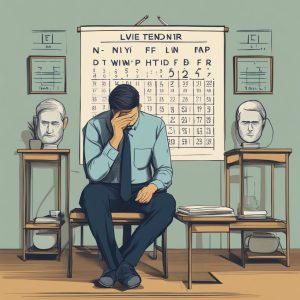Headache After Eye Exam: Causes
Headache After Eye Exam: Causes and Remedies

If you’ve ever experienced a headache after an eye exam, you’re not alone. Many people feel discomfort or pain after an eye exam. It can be frustrating to deal with the symptoms. However, there are steps you can take to prevent and treat headaches after an eye exam.
Understanding headaches post eye exam is important to help you know how to manage the pain. One of the most common causes of headaches after an eye exam is eye dilation. When your eyes are dilated, it can cause sensitivity to light. This can trigger a migraine headache in some people. Other causes of headaches after an eye exam may include eye strain, dehydration, or stress.
Prevention and treatment are key when it comes to headaches after an eye exam. To prevent headaches, it’s important to stay hydrated, get plenty of rest, and avoid bright lights or screens for a few hours after your exam.
If you do experience a headache, over-the-counter pain relievers like ibuprofen or acetaminophen can help. Additionally, you can try using a cold compress or resting in a dark room to ease the pain.
Key Takeaways
- Headaches after an eye exam are common and can be caused by eye dilation, eye strain, dehydration, or stress.
- To prevent headaches, stay hydrated, rest, and avoid bright lights or screens after your exam.
- To treat headaches, use over-the-counter pain relievers, cold compresses, or rest in a dark room.
Understanding Headaches Post Eye Exam
If you’ve ever experienced a headache after an eye exam, you’re not alone. It’s a common side effect that can be caused by a variety of factors. In this section, we’ll explore some of the reasons why headaches occur after eye exams.
Causes of Headaches After Eye Exams
There are several reasons why you might experience a headache after an eye exam. One of the most common is eye dilation. When your pupils are dilated, they become larger and let in more light. This can cause your eyes to be more sensitive to light, which can trigger a headache. Additionally, the drops used during the exam can cause irritation and discomfort, leading to a headache.
Another potential cause of headaches after an eye exam is eye strain. During the exam, you may be asked to look at a digital screen for an extended period of time. This can cause eye strain, which can lead to a headache. Additionally, exposure to blue light from digital screens can disrupt your sleep patterns and cause headaches.
Eye Dilation and Light Sensitivity
Eye dilation is a common part of an eye exam. During dilation, your pupils are enlarged to allow the doctor to get a better look at your retina. While dilation is necessary for a thorough exam, it can also cause light sensitivity and headaches. If you experience a headache after an eye exam, it’s possible that dilation is the cause.
Screen Time and Eye Strain
In today’s digital age, many of us spend a significant amount of time looking at screens. Whether it’s a computer, phone, or tablet, all of this screen time can cause eye strain and headaches.
During an eye exam, you may be asked to look at a digital screen for an extended period of time. This can exacerbate any existing eye strain and cause a headache.
To reduce your risk of headaches after an eye exam, it’s important to take breaks from digital screens and rest your eyes. Additionally, you can talk to your doctor about alternative testing methods that don’t require as much screen time.
Prevention and Treatment
Protective Measures and Lifestyle Changes
If you experience headaches after an eye exam, there are some protective measures and lifestyle changes you can adopt to prevent it from happening.
First, you can wear sunglasses after the eye exam to protect your eyes from bright light. You can also take a rest after the exam to reduce the strain on your eyes. Make sure to avoid any activities that require intense focus such as reading or using a computer.
Stress can also trigger headaches, so it is important to manage your stress levels before and after the exam. You can try relaxation techniques such as deep breathing exercises, meditation, or yoga.
Additionally, you can schedule your exam at a time when you are less stressed or have fewer responsibilities.
When to Consult a Doctor
If your headaches persist or become severe, it is important to consult an eye doctor or ophthalmologist. They can examine your eyes and determine if there is an underlying condition causing the headaches.
Treatment options may include eye drops, prescription medications, or other therapies depending on the cause of the headaches.
It is important to follow the doctor’s instructions and take any prescribed medications as directed. If you experience any side effects or have concerns about the treatment, do not hesitate to contact your doctor.
Frequently Asked Questions
Why might I experience a headache following an eye examination?
It is not uncommon to experience a headache following an eye examination. One of the most common reasons for this is due to the stress and anxiety that some people experience during the exam. This is often referred to as “white coat syndrome” and can cause increased tension in the head and neck muscles, leading to a headache. Additionally, the bright lights used during the exam can also contribute to a headache.
Are headaches common after pupil dilation during an eye exam?
Yes, headaches are a common side effect of pupil dilation during an eye exam. The dilation process involves the use of eye drops that cause the pupils to become larger, allowing the eye doctor to see the back of the eye more clearly. This can result in an increase in light sensitivity, which can cause headaches in some people.
What should I avoid doing after my eyes have been dilated?
After your eyes have been dilated, it is important to avoid driving until the effects of the dilation wear off. This can take several hours, depending on the individual. Additionally, it is important to avoid bright lights and direct sunlight, as this can exacerbate light sensitivity and cause a headache.
How long can I expect a headache to last after an eye exam?
The duration of a headache following an eye exam can vary depending on the individual and the cause of the headache. In some cases, the headache may only last a few hours, while in others it may persist for several days. If you experience a headache that lasts longer than a day or two, it is important to consult with your eye doctor.
Could eye strain during an exam lead to a headache?
Yes, eye strain during an exam can lead to a headache. This is especially true if you are not used to reading or focusing for extended periods of time. Taking frequent breaks and practicing good eye hygiene, such as blinking regularly and adjusting your posture, can help to alleviate eye strain and prevent headaches.
What steps can I take to alleviate a headache after an eye examination?
If you experience a headache after an eye examination, there are several steps you can take to alleviate the discomfort. Over-the-counter pain relievers, such as ibuprofen or acetaminophen, can help to reduce pain and inflammation.
Applying a cold compress to the forehead or temples can help to alleviate tension and provide relief. Resting in a dark, quiet room can also help to reduce the severity of a headache.

